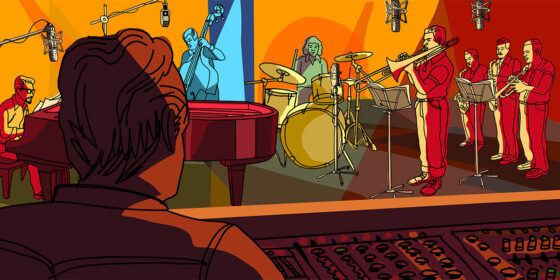TIFF 2023 | They Shot the Piano Player (Fernando Trueba, Javier Mariscol, Spain/France) — Centrepiece

By Jay Kuehner
The dulcet caress of bossa nova often belies a sense of soft anguish and deep melancholy, the form giving expression to an excess of longing in both lyrical and musical form. Something similar might be said of Fernando Trueba and Javier Mariscol’s tribute to one of the genre’s lost virtuoso pianists, Francisco Tenório Junior, whose enigmatic and tragic bio is more the stuff of a plangent vérité documentary than an ostensibly naive animation.
Of course, animation has been used on occasion to confront a host of atrocities to rather poignant effect, but Trueba and Mariscol, following from their romantic musical Chico and Rita (2010), seem unlikely chroniclers of forced disappearance under Brazil’s military dictatorship (and, by proxy, Argentina’s). They Shot the Piano Player, however, stakes its claim as more documentary than biopic, save for a narrative contrivance that introduces the story by way of a New Yorker journalist investigating Tenório’s fate as the subject of a book (voiced, unconvincingly, by Jeff Goldblum). Otherwise, the film relies on a host of oral testimonies from an auspicious roster of MPB luminaries who knew him, among them João Gilberto, Caetano Veloso, Gilberto Gil, Vinicius de Moraes, and Paulo Moura.
The titular riff on Truffaut’s nouvelle vague noir is not incidental, linking the respective modernist movements that swayed French and Brazilian culture in the late ’60s (both indebted to US antecedents such as David Goodis and Chet Baker). The film situates art—with bossa nova representing a kind of expressive apotheosis—against the manifold forces of political oppression, in particular the insidious variations then taking hold in South America. The circumstances of Tenório’s disappearance remain vague: on tour in Buenos Aires in 1976, supporting Vinicius de Moraes and Toquinho, he was arrested by military patrol while stepping out for a sandwich, or cigarettes, or medicines for his girlfriend. He was subsequently imprisoned and tortured in the ESMA (Navy Mechanics School) and summarily executed within days. Whether it was an act of senseless violence or a case of mistaken identity is still unknown.
The film’s bossa sway is momentarily silenced by such revelations—the crate-digger’s delight that the film so breezily achieves is forced to reckon with the horrors of human rights abuses. Music is, in this sense, always political. There’s no way to wrap this rancid episode of history in anything less than moral trembling, and the contrasting use of animation may draw this out in palatable if not instructive ways. It’s not poetry after Auschwitz, but rendering a ’70s Ford Falcon in Argentina by pen and ink requires some measure of conscience. How we move from “Chega de Saudade” to “Nunca Más” tells us something about beauty and terror. Trueba and Mariscol have composed their own ballad of tropical tristesse.
Jay Kuehner

